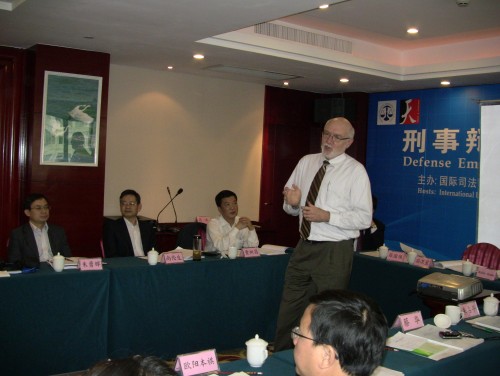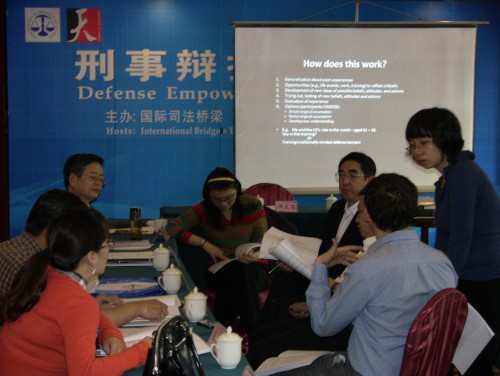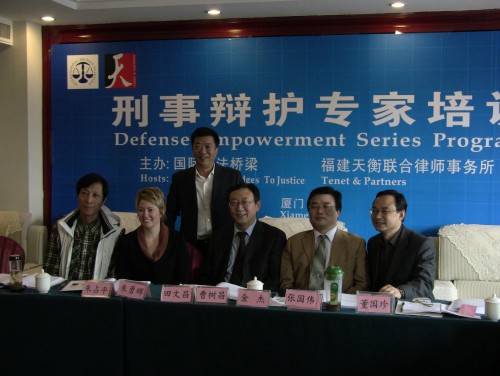
Monday saw the curtain rise on IBJ China’s “Defender Empowerment Series” (DES) program, with a series of lawyers from across the country arriving in Xiamen for a week-long “training of trainers” sponsored by IBJ and its partner Tenet & Partners. This program, the formal beginning to a long-anticipated three year project, is designed to extend the benefits of defense litigation to the indigent accused around the country by creating a network of exceptional defense lawyers and empowering them with modern training methodologies. With this knowledge in hand, the participating lawyers will proceed to spread advocacy skills through their own trainings of advocates around the country, as well as help to train future trainers in a self-propagating cycle of improvement.
After introductions and a brief overview of the program by the interim China Program Director Aurora Bewicke and Professors Zhang and Sun, focus moved quickly to training methodologies and approaches. Although not immediately apparent, even the introductions were a prime example of IBJ’s training model, as participants traded stories of themselves, each other and the world as they see it, deeply engaging with one another before sharing their partners’ stories with the group. Continuing through the day, expert trainers Tim Millar and Robert Burke introduced key concepts and trends in legal advocacy training, with participants breaking into small groups to discuss and debate their goals as future trainers. The day finished off with closing comments by Professor Zhang Guowei, a prestigious visitor from IBJ’s long-standing partner China University of Politics and Law. “For many of the lawyers joining in this training, these methods are quite particular. As I understand it, the crucial point here is interactivity.” As the professor explained it, “In [IBJ’s] trainings, the problems comes from the participants, and the solutions also come from the participants. […] In this manner, we can increase the activeness of students’ participation.”
The second day kicked off with a variety of sessions. Participants began by envisioning the potential effects of their training on the lives of the indigent accused and how they could strengthen China’s legal system. Activities then began to focus in on training design and evaluation, with a session on how to implement transformative learning and measuring the impact of that learning by means of the Kirkpatrick model. The second half of the day consisted of a class with the the head of the All China Lawyers Association (ACLA), the distinguished Professor Tian Wenchang. Over the course of his lesson, Professor Tian and the future trainers touched on a variety of topics to be featured in DES advocacy programs, including dealing with upcoming amendments to the criminal procedure law, the place of defenders in China’s legal system, and the difficulties of bringing a theoretical understanding of criminal law into practice.
The training of trainers will continue through this Friday, at which point the participants will return to their various provinces and begin to plan trainings of their own. We will continue to follow their progress throughout the week.


